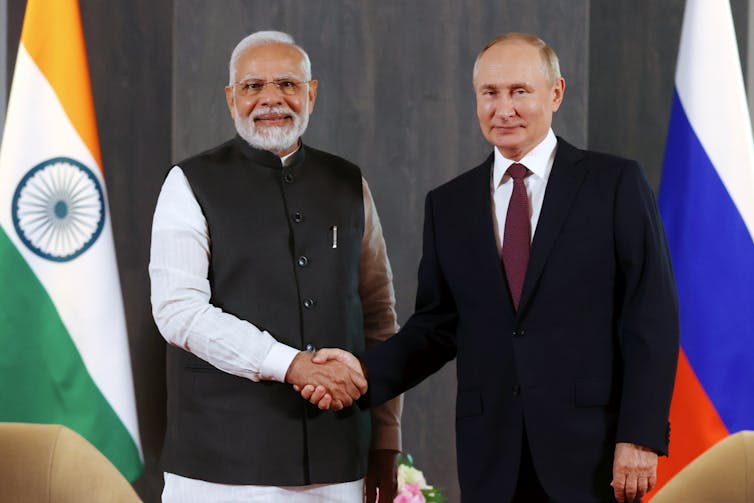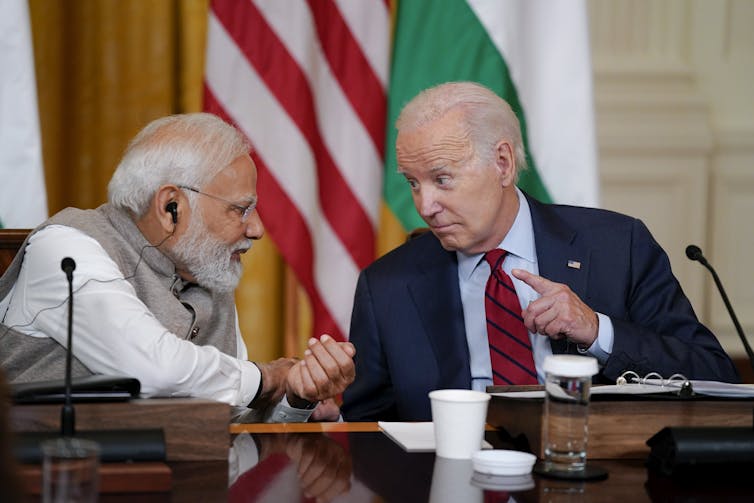[ad_1]
Canada’s deepening divide with India following its accusation that the Indian authorities was liable for the murder of Canadian citizen Hardeep Singh Nijjar has revealed a cynical reality: the West’s curiosity in democracy and rules-based worldwide order is essentially empty rhetoric.
Canada’s western allies have offered some support in its confrontation with India. However, this support is extremely limited. India is simply too essential to American efforts to include China.
India understands this and is taking full benefit of its place on this ongoing geopolitical chess sport by getting what it could possibly from the West whereas conserving a transparent focus by itself pursuits.
India is a regional rival of China. It may have passed China as the world’s most populous country and is, by purchasing power parity, the world’s third largest economy.
The United States is attempting to redirect international sources and supply chains from China to India. Supposedly, India is “safe” as a result of it shares “democratic values” with the West.
Modi regime
However, India’s so-called liberal democracy has been severely broken by the Hindu-supremacist policies of the Narendra Modi regime.
In trendy India, non secular minorities, particularly Muslims, are usually victims of mob violence, including lynching and sexual assault.
A rabid nationalist media pumps up authorities insurance policies. Critical journalists are brutalized and silenced. The judiciary and parliament have been cowed.
Indian writer Arundhati Roy argues that India is well on its way to becoming a fully fascist state. Roy was recently charged by the Modi regime for supposedly “provocative” statements she made in 2010.

(AP Photo/Altaf Qadri)
The western world is aware of all of this, however its actions in the direction of India aren’t motivated by “shared values.” The West, led by the U.S., is pushed solely by the will to include China.
India has rejected Canada’s accusations, however has additionally flagged western hypocrisy. Indian MP Shashi Tharoor has alleged the U.S. and Israel are the “two foremost practitioners of extra-territorial assassinations in the past 25 years.” American drone warfare has killed thousands of people the U.S. accuses of terrorism and thousands of innocent bystanders within the Global South.
India could also be following the West’s lead, however on a a lot smaller scale. Also, it allegedly acted in a western state, which seemingly anticipate to be exempt from the form of violence they’ve unleashed on the Global South.
Read extra:
India’s accusation of ‘terrorism’ is a ploy to hide its own human rights abuses
Not an American pawn
India is pleased to just accept western economic, military and technological support to help it close its enormous gaps in wealth, infrastructure and overall development with China. The West, meantime, wants India to take care of its international domination.
But India has no more interest in perpetuating western dominance of the global system than China does. It just isn’t an American pawn.
India is pursuing its own interests, as its persevering with relationship with Russia signifies.

(Alexandr Demyanchuk, Sputnik, Kremlin Pool Photo by way of AP)
India and China have a major border dispute and are militarily at odds. They view each other with mutual suspicion and, typically, contempt.
But they perceive that they are going to be neighbours eternally and their relationship might be mutually helpful if they can find diplomatic resolutions to their conflicts. This may be easier said than done, however the two international locations have improved relations in the past and revel in a rising financial relationship at this time.
Most Indians settle for that making an active enemy of China is not in India’s best interests.
The extra aggressive the U.S. turns into in the direction of China, the more leverage it gives to India to use against both the Americans and the Chinese. India can extract advantages from the U.S.; concurrently, American aggression supplies China with incentives to enhance its relations with India.
Choosing a facet
But there’s a level — maybe quick approaching — at which regional states will really feel pressured to choose between China or the U.S. There’s a restrict to how far either side might be performed off towards the opposite.
Tensions between India and China profit U.S. pursuits. If India and China resolve their variations and select to work collectively — or, no less than, to not work towards one another — it could complicate these pursuits. As unlikely as this will appear now, harmonious relations between China and India are a real long-term possibility.
India is way from posing a menace to American energy the best way China is now. Nonetheless, if the U.S. succeeds in elevating India at China’s expense, it should ultimately should deal with challenges from India. It’s already clear that India doesn’t see itself as a western subordinate and has its personal regional aspirations.

(AP Photo/Evan Vucci)
India’s alleged homicide of a Canadian citizen could also be a style of how India will deal with its relations with the West because it rises in energy. India might be demanding privileges the West extends to itself and its allies, for whom “rules-based international order” is a meaningless facade.
Canada has asked India to co-operate in its investigation of Nijjar’s homicide. The investigation will most likely go nowhere and be quietly buried. There are suspicions that India could also be threatening other Sikh activists and should have committed another murder within the U.Ok.
India has recently eased some visa restrictions on Canadians even as it has expelled 41 Canadian diplomats, threatening to revoke their diplomatic immunity.
India will stroll away untouched from its spat with Canada. It is simply too essential to western methods towards China. But India has its personal sport to play and that doesn’t essentially accord with what the West needs.
[adinserter block=”4″]
[ad_2]
Source link